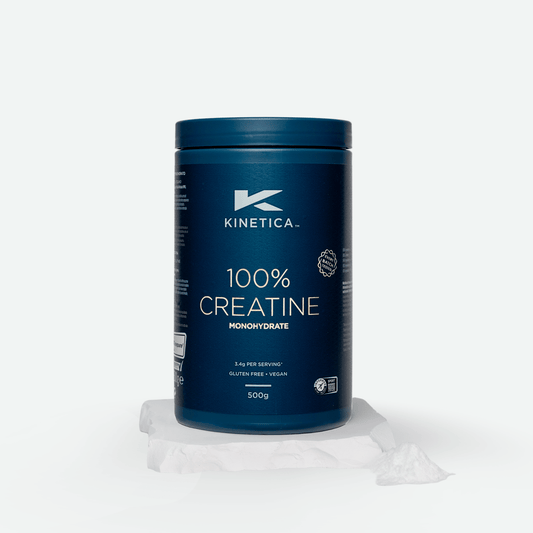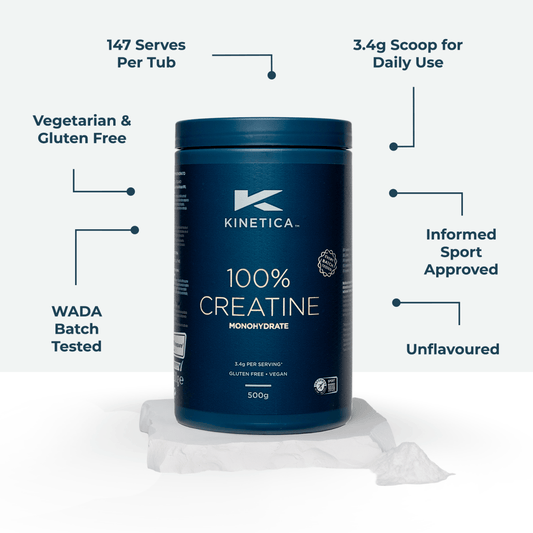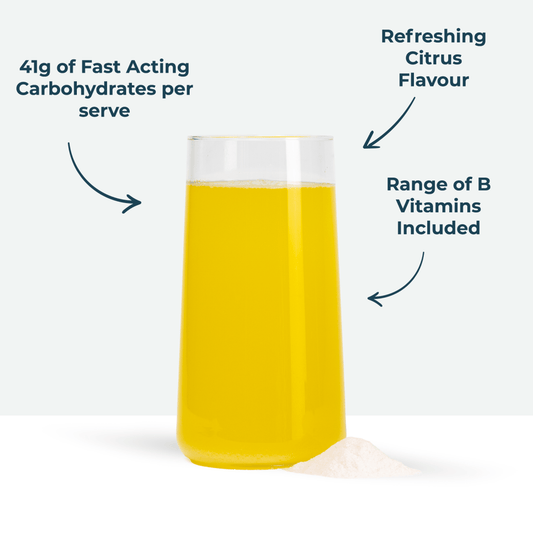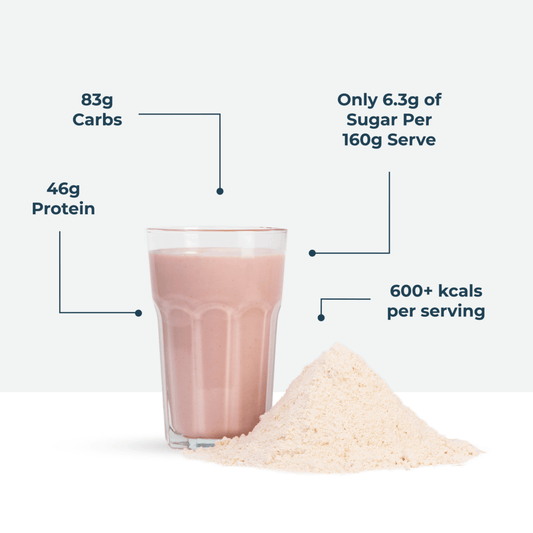Supplements for Rugby Players: Enhancing Strength & Supporting Recovery

Rugby is a sport with varying demands, characterised by differing positions on the field, including intermittent activities such as sprinting, tackling, and other physical contacts (Cousins et al, 2023). Despite positional differences, players are expected to have a mix of aerobic and anaerobic qualities, such as power, speed, strength and skill components (Duthie et al, 2003, Bevan et al, 2010). Given the demands placed on players, pre-season tends to last for 6-12 weeks in duration and is periodised in a way that players can improve their body composition, strength and power (Bradley et al, 2015).
It is essential to fuel these intermittent and high intensity efforts with a high carbohydrate diet (Thomas et al, 2016). Higher carbohydrate diets can lead to better adaptations in strength-based gym programmes and sporting performance (Mata et al, 2019, Philp et al, 2012). Therefore, rugby players should include carbohydrate-based foods, such as potatoes, pasta, rice, fruits, vegetables and other grains and legumes in their daily diet.
Carbohydrate-based supplements, such as Kinetica Sports OatGain, can be useful in the hours leading up to training sessions, to ensure glycogen stores are maintained and therefore a more favourable outcome from training is obtained. If training demands are high, or an athlete’s time is constrained, other forms of carbohydrate supplementation may become useful. These include carbohydrate gels, such as Kinetica Sports Energy Gels, or carbohydrate powders like Kinetica Sports Energy. Other fast-digesting food sources of carbohydrates include sports drinks, cereal bars and dried fruit.
While resistance training is the key component in gaining strength and increasing lean mass, protein intake from food and supplements can augment further changes in adaptations (Pasiakos et al, 2015, Phillips, 2011 and Tipton & Phillips, 2013), supporting rugby players’ needs.
Hoffman et al (2007) also showed that protein supplementation can have a positive impact on strength gains, while Jager et al (2017) states that there’s ample evidence from single investigations showing that protein supplementation can exert small, but significant, strength gains in both males and females.
Therefore, it would be prudent for male and female rugby players to ensure that they achieve the recommended protein intake through foods or a protein supplement within their daily diet. Kinetica Sports has various whey protein products and plant protein options to cater for differing dietary beliefs and needs around protein supplementation.
Kinetica Sports Clear Whey is a whey protein isolate product, reducing the concentration of components like lactose which may not be tolerated by all athletes. Kinetica Sports Plant Protein is another option for athletes that like to focus on a plant-based diet. Both of these products contain enough protein per serve to support lean muscle growth and help with hitting your daily protein requirements.
Creatine is the most effective nutritional aid when it comes to enhancing exercise capacity and improvements in lean mass (Buford et al, 2007). It has been reported to improve both short- and long-term gains in strength and performance by 5-15% (Kreider, 2003). Significant strength increases have been observed in exercises such as bench press and squat with the use of creatine supplementation throughout the course of a 12-week programme (Volek et al, 1999). It has already been stated by Bradley et al (2015) that this is the equivalent of the longer duration of pre-season for a rugby team. By using Kinetica Sports Creatine Monohydrate alongside your strength training programme, you could see more gains in strength and lean mass, without any extra effort, maximising your training.
Creatine has positive effects on strength in both males and females (Smith-Ryan et al, 2021), as well as having additional benefits with regards to women’s health (Smith-Ryan et al, 2021), exercise recovery and injury recovery among others (Kreider et al, 2017). It is a supplement that could be taken for strength improvements, but can have secondary benefits in other areas of an athlete’s sports performance and health.
Caffeine supplementation may incur small but significant enhancements to strength training (Camilio et al, 2021). The optimal dose of caffeine to improve strength training is still uncertain (Grgic et al, 2018), however, doses as low as 100mg have shown improvements in resistance training exercise (Astorino & Robertson, 2010). Kinetica Sports Prefuel provides 94mg of caffeine and could be useful in conjunction with an effective training programme.
With regards to recovery from rugby training, gym sessions or any sports training and performance, it is best to focus on the 3 R’s of recovery – repair, refuel, rehydrate. This template allows the athlete to obtain carbohydrates for refuelling, protein for muscle repair, fluids for rehydration.
There is a clear reduction in muscle glycogen following rugby game play, and therefore that glycogen, or stored carbohydrate, needs to be replaced (Bradley et al, 2016). This can be done using carbohydrate-based foods or supplements.
Players should be aiming for roughly 1g of carbohydrate per 1kg of bodyweight at every hour for the first 3-4 hours post-game (Burke et al 2017, Thomas et al, 2016). This can be broken up into various stages in the post-game events.
For example, while players can take their time to get back into the changing rooms, debrief with team management, sit and chat around match incidents and general socialising, they can casually tick off the first steps in their recovery by consuming a protein and carbohydrate drink. This could be a Kinetica Sports High Protein Milkshake, Kinetica Sports Recovery powder or a combination of supplements and leftover match day snacks such as cereal bars, fruit, sports drinks and jellies.
The second stage of post-match recovery should come in the form of a meal. Practically, this will be a post-match meal that might be consumed within the club or after getting home. Some simple options include a chicken stir fry, curry, shepherd’s pie or even some pizza with side salad.
Hudson et al (2020) showed that carbohydrate needs and metabolic rate would be increased the day after a match too, with forwards experiencing a greater need than backs, likely due to higher collisions within the game. Therefore, a higher carbohydrate intake should be utilised for 1-2 days post-match.
Recovery from strength sessions wouldn’t have the same needs as match days. Players should aim for a carbohydrate-based meal in conjunction with an overall carbohydrate intake of 3-5g per kilogram of bodyweight (Burke et al, 2011, Bradley et al 2016).
Within those 24-48 hours after the match or gym sessions, protein intake plays a key role in repair. Meals and snacks should incorporate 20-25g of high-quality protein, every 3-4 hours (Koopman et al, 2007, Morton et al 20015, van Loon, 2013). We have already identified that protein and carbohydrate drinks can be utilised as an early recovery tool in the dressing room. Kinetica Sports High Protein Milkshakes will provide a perfect protein serving with some carbohydrates to initiate your recovery.
Whey protein has been shown to stimulate the muscle protein response more effectively than soy or casein products. Kinetica Whey Protein, Lean Active and Clear Whey are strong options to improve the recovery process. Kinetica Sports OatGain can also be consumed. It contains carbohydrates and protein to help with recovery and repair.
While whey protein has been shown to be the most effective, plant-based protein options can have a similar effectiveness, especially in cases where a blend of different plant-based sources are used (Nichele et al, 2022). Kinetica Sports Plant Protein has a blend of pea and rice, of which 87% is attributed to pea protein. This blend, high in pea protein, can improve the digestibility of the protein source and provide a suitable recovery shake for rugby players who may prefer a plant-based option.
While there should be sufficient time in the days after a game to recover and rehydrate, players should still aim to rehydrate by replacing fluids and electrolytes soon after the match, especially if faster recovery is required (Shirreffs & Sawka, 2011). The need for replacing electrolytes lost in sweat to achieve full rehydration is well established. This can be done through the use of an electrolyte-based rehydration solution, or through the consumption of fluids alongside meals that are high in sodium and potassium (Maughan et al, 1996). Kinetica Sports Electro-C tablets provide both of these electrolytes, among others.
For complete rehydration, aim to consume 1.5L of fluid for each 1kg of weight lost during exercise. Foods and beverages containing sodium will likely aid this rehydration. Protein, carbohydrate and fluids are considered the most essential nutritional aspects of recovery, and although other micronutrients may play a role in the recovery process, more research is needed in many cases (Heaton et al, 2017).
Supplements can help to enhance strength training and recovery. Athletes should use a food first approach where possible, however some supplements can be used to enhance strength training and support recovery.


















